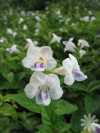 |
 |
flowers
Their Spiritual significance
Photo Collection
Trust of the emotional vital in the Divine
Smiling and sweet, it is sheltered from grief.
Asystasia gangetica (L.) T. Anderson (Acanthaceae)
Chinese violet
White flower with a lavender spot on the throat
Trust in the Divine
If you pray, trust that he hears. If the reply takes long in coming, trust that he knows and loves and that he is wisest in the choice of the time. Meanwhile quietly clear the ground, so that he may not have to trip over stone and jungle when he comes.
Sri Aurobindo
Sri Aurobindo. Sri Aurobindo Birth Centenary Library in 30 Volumes. - Volume 23. - Letters on Yoga.-P.2-3
The core of the inner surrender is trust and confidence in the Divine. One takes the attitude: "I want the Divine and nothing else. I want to give myself entirely to him and since my soul wants that, it cannot be but that I shall meet and realise him. I ask nothing but that and his action in me to bring me to him, his action secret or open, veiled or manifest. I do not insist on my own time and way; let him do all in his own time and way; I shall believe in him, accept his will, aspire steadily for his light and presence and joy, go through all difficulties and delays, relying on him and never giving up. Let my mind be quiet and trust him and let him open it to his light; let my vital be quiet and turn to him alone and let him open it to his calm and joy. All for him and myself for him. Whatever happens, I will keep to this aspiration and self-giving and go on in perfect reliance that it will be done."
Sri Aurobindo
Sri Aurobindo. Sri Aurobindo Birth Centenary Library in 30 Volumes. - Volume 23. - Letters on Yoga.-P.2-3
Trust is the mind's and heart's complete reliance on the Divine and its guidance and protection.
Sri Aurobindo
Sri Aurobindo. Champaklal Speaks / [Compiled by Champaklal].- 1975, P.221.
Who trusts the Divine never leaves the loving arms of the Divine wherever his body may be.
The Mother
The Mother. White Roses: [Letters to Huta] / Compiled by Huta D. Hindocha.- Pondicherry, 1980, P.96
The third characteristic of consciousness is the emotion of pleasure in existence, primarily in one's own, sympathetically in all existence, the Will to enjoy. This is the most powerful and fundamental of emotions, - so powerful as to persistently outlast all the pain and struggle which the hampered existence of Spirit in Matter brings to the personality. Showing itself physically at first in mere sense-pleasure and the clinging to life, it develops psychically in the emotions of love and joy, and culminates spiritually in the delight of our psychical personality in contact with or entering into the impersonal existence of our real and infinite Self.
Sri Aurobindo
Sri Aurobindo. Isha Upanishad
To enlighten the physical mind by the consciousness of the higher spiritual and supramental planes is one object of this yoga, just as to enlighten it by the power of the higher vital and higher mental elements of the being is the greatest part of human self-development, civilisation and culture.
Sri Aurobindo
Sri Aurobindo. Sri Aurobindo Birth Centenary Library in 30 Volumes. - Volume 22. - Letters on Yoga.-P.1